Who gets to talk, when, and for whom is a conversation I can’t get enough of. For me this is one of the crucial elements of feminism (besides, you know, equal rights and control over one’s own body). It’s a conversation we don’t have enough in literature, though I’m glad we’re having it more often than we used to. And it’s something I started thinking deeply about this past week as I was finishing up reading I Am Cleopatra by Natasha Solomons and Cyborg Fever by Laurie Sheck.
Feminist Retellings of History in I Am Cleopatra
 I Am Cleopatra starts strong, with the title character addressing us directly, “I want you to see me as I am. You can dislike me, love me or abhor me, but know me first. I was born a girl and a goddess. A future queen, if I should live that long.” It’s a compelling beginning for a character we’ve most often known through the men she loved or bedded (or both), and we certainly get to know Cleopatra more intimately than ever before.
I Am Cleopatra starts strong, with the title character addressing us directly, “I want you to see me as I am. You can dislike me, love me or abhor me, but know me first. I was born a girl and a goddess. A future queen, if I should live that long.” It’s a compelling beginning for a character we’ve most often known through the men she loved or bedded (or both), and we certainly get to know Cleopatra more intimately than ever before.
The character Solomons portrays is intelligent and strategic. She’s also young and afraid. I enjoyed getting inside her motivations as her father courts the favor of the Romans, she marries her brother to become queen, she’s betrayed by that brother, and Caesar enters her life. She’s also human: menstruating and virginal when she first meets Caesar, having popped out of the laundry bag she was smuggled into her own palace inside. We see her acknowledge her own fears and work to overcome them in the name of her people. It’s a beguiling portrayal, even if (and maybe because) she is less the seductress than we’ve previously seen her be.
Through Cleopatra we get to know Charmian, the girl who has been her slave since they were both born. There is a class distinction here as Charmian is never a narrator in the story, though this Cleopatra does see the plight of the common people around her more than we might expect. That in and of itself is a nice change, though I wouldn’t say this queen is fully “woke.”
The other character who gets to narrate her own plight is Servilia, lover of Caesar (in Rome) and mother of Brutus. Servilia counsels the young princess on her first visit to Rome and then disappears from the book for awhile as Caesar mires himself in Egypt and Egyptian politics. We meet her again and in earnest when Caesar brings Cleopatra to Rome.
The absence of Servilia from much of the middle of the book is a flaw as I see it, because Servilia has a rich perspective of her own, and I was enjoying learning about Rome through her eyes. It’s also the crux of what makes me think about feminism and voice in this book. I love that (for once) this story is told in the voices of the women. I did not love that the action then revolves entirely around the men (especially Caesar). I understand why the book is structured this way, it follows the action and HIStory as we know it, but I wanted to stretch into something new, something that might have passed the Bechdel Test (and I wondered how far from history an author would have to venture to make that happen).
Myriad Voices in Cyborg Fever
 In sharp contrast, Cyborg Fever by Laurie Sheck is a hybrid text that took me all kinds of places I never thought I would go. The voices in this book include Erwin (the narrator), a nun and a cyborg that talk to him, and Deadpool (who talks to the cyborg). Don’t let the ridiculous sound of that last sentence fool you, this book is intelligent and funny and I’m still pondering its meanings and ramifications.
In sharp contrast, Cyborg Fever by Laurie Sheck is a hybrid text that took me all kinds of places I never thought I would go. The voices in this book include Erwin (the narrator), a nun and a cyborg that talk to him, and Deadpool (who talks to the cyborg). Don’t let the ridiculous sound of that last sentence fool you, this book is intelligent and funny and I’m still pondering its meanings and ramifications.
“Maybe meaning lies in the not-understanding, in the ways things shut us out. All the ways that we remain unknowing.” – Laurie Sheck, Cyborg Fever
I’m not going to lie, sometimes I got lost as Erwin’s musings covered entropy, Borges, orphan planets, Tesla, Einstein, the discovery of black holes, a nun who cannot attach to an infant, Professor Xavier (of the X-Men), musings on loneliness, the chemical roots of empathy, engineering humans for war, Laika, and so, so much more. There were hundreds of historical tidbits and tangents I wanted to track down, fact check, or follow. Sheck weaves them together artfully into a tantalizing exploration of what it means to be human and what comes next. But, as far as I can tell, she’s providing as many questions as answers (which makes the book far more interesting to read).
“To be knowledgeable is to know you cannot know.” – Laurie Sheck, Cyborg Fever
I was particularly excited to read this book in this moment as I’ve been working with AI in my day job. It’s been instructive to see how information is collated, where errors get introduced into a system, and how much it seems like the engines prefer to be wrong than to admit not knowing. To me that is the fatal flaw, where growth stops, because the machines cannot then be curious. This limitation makes me wonder about the people who designed the systems, what their limits are.
“A map is a set of agreed-upon errors.” – Laurie Sheck, Cyborg Fever
It was also interesting to ponder algorithms and how Erwin is getting introduced to his information. I spend a lot of time editing guides related to search engine optimization, so I get to see behind at least one of the curtains of how decisions are made for us online. It’s something I think a lot about as my son learns to navigate around the walled garden we’ve tried to create for him online.
“I didn’t realize algorithms can lead you from one topic to another without your suspecting you’re being lead—you just think you’re making choices.” – Laurie Sheck, Cyborg Fever
As much as this book introduced me to all kinds of wonderful and fascinating ideas, it really hit home for me with the Deadpool appearance. Not because I’m a Marvel superfan, but because I live with one; and nothing beats telling your 10-year-old at the breakfast table that the deep book you’ve been reading actually featured the star of the movie he had everyone watch last week (Once Upon a Deadpool—highly recommend if you are not a super hero fan but need something to watch with someone who is, because it works on many levels, like this book). The book also connected to Alien Earth (highly recommend this because no one does layered storytelling on TV like Noah Hawley) with the idea that “new kinds of bodies lead to new thoughts” and I was left wondering how close we are to a future of company towns in space and people who give their whole lives (and in some cases bodies) over to corporations. Shudder.
Although reading while exhausted was either the best way to encounter this story or the worst (definitely not in between), I appreciated how many voices came through and what a broad expanse of inquiry Sheck presented. It’s a book I will read again.
If you want to hear the voices of either of these books for yourself, I Am Cleopatra comes out on October 21 (but you can pre-order it now) and Cyborg Fever is available now from Bookshop.org. If you use those links to purchase, you’re keeping indie bookstores in business and I receive a commission.
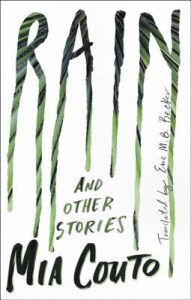 After reading more of Bolaño’s 2666 than I ever should have, I cleaned my bookshelves of all the to-read have-tos that I’ve held on to for far too long. And found myself without anything to read. Failure to read good books generally puts me in a state of existential crisis, so I decided to return to an old favorite—Portuguese author António Lobo Antunes. Even after leafing through a few chapters in random order, I could feel myself restored. And I wanted more, so I turned to my shelf of books to review and found Mia Couto, a writer from Mozambique who also writes in Portuguese. I’ve spent a few wonderful days now with Rain and Other Stories and want to share with you the experience of reading this man’s work with Lobo Antunes in the background.
After reading more of Bolaño’s 2666 than I ever should have, I cleaned my bookshelves of all the to-read have-tos that I’ve held on to for far too long. And found myself without anything to read. Failure to read good books generally puts me in a state of existential crisis, so I decided to return to an old favorite—Portuguese author António Lobo Antunes. Even after leafing through a few chapters in random order, I could feel myself restored. And I wanted more, so I turned to my shelf of books to review and found Mia Couto, a writer from Mozambique who also writes in Portuguese. I’ve spent a few wonderful days now with Rain and Other Stories and want to share with you the experience of reading this man’s work with Lobo Antunes in the background.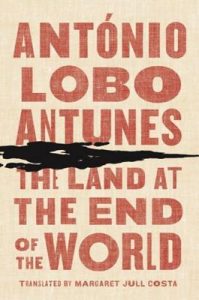 I’ve
I’ve 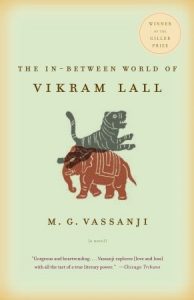 How many book reviews can I write about diaspora? Maybe a lot because the feeling of not knowing where or what home is is something I struggle with. So when I picked up The In-Between World of Vikram Lall by MG Vassanji as part of the great India book grab, thinking that because the author’s name sounded Indian, it must be about India, I was making an assumption that shows how much I want life to fit into identifiable little boxes. Instead, I found a story much more similar to my own life, a story of a man living away from his ancestral home and trying to figure out who that makes him.
How many book reviews can I write about diaspora? Maybe a lot because the feeling of not knowing where or what home is is something I struggle with. So when I picked up The In-Between World of Vikram Lall by MG Vassanji as part of the great India book grab, thinking that because the author’s name sounded Indian, it must be about India, I was making an assumption that shows how much I want life to fit into identifiable little boxes. Instead, I found a story much more similar to my own life, a story of a man living away from his ancestral home and trying to figure out who that makes him.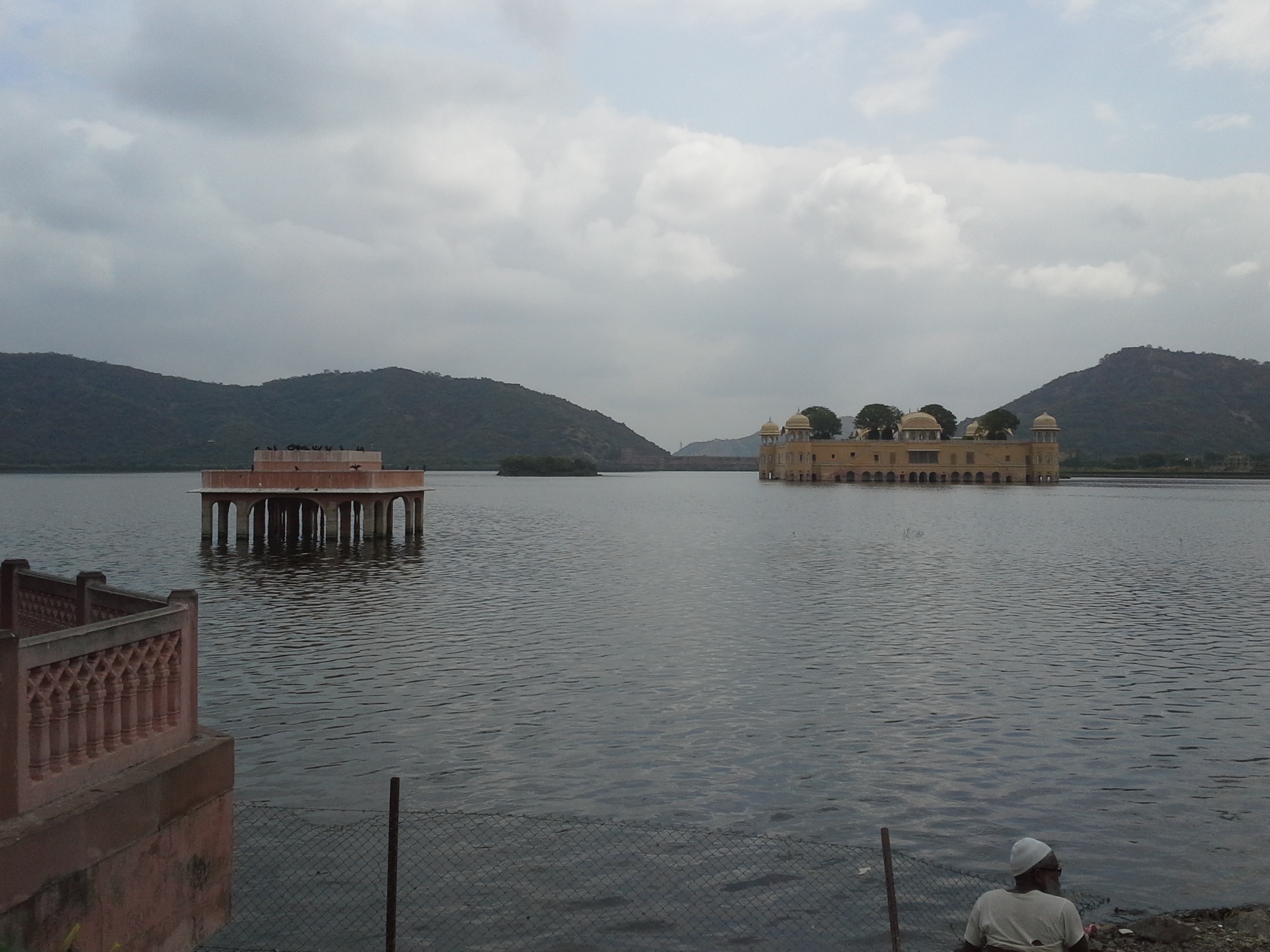
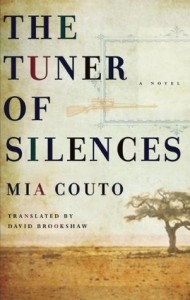 I wrote recently about a
I wrote recently about a 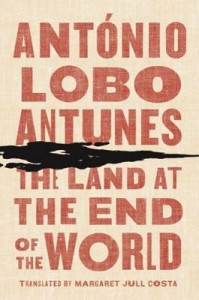 There are a very few writers I turn to when I really need something that is guaranteed to blow my writing mind. On one end I turn to Italo Calvino for the prismatic layers beneath his concise language and on the opposite end is the lusciously messy work of Antonio Lobo Antunes, and neither has disappointed me yet. I often hold back from reading these authors, admiring them for months before ever opening them. I’m always slightly worried that this will be the book that lets me down. The Land at the End of the World by Antonio Lobo Antunes rocked my world.
There are a very few writers I turn to when I really need something that is guaranteed to blow my writing mind. On one end I turn to Italo Calvino for the prismatic layers beneath his concise language and on the opposite end is the lusciously messy work of Antonio Lobo Antunes, and neither has disappointed me yet. I often hold back from reading these authors, admiring them for months before ever opening them. I’m always slightly worried that this will be the book that lets me down. The Land at the End of the World by Antonio Lobo Antunes rocked my world.